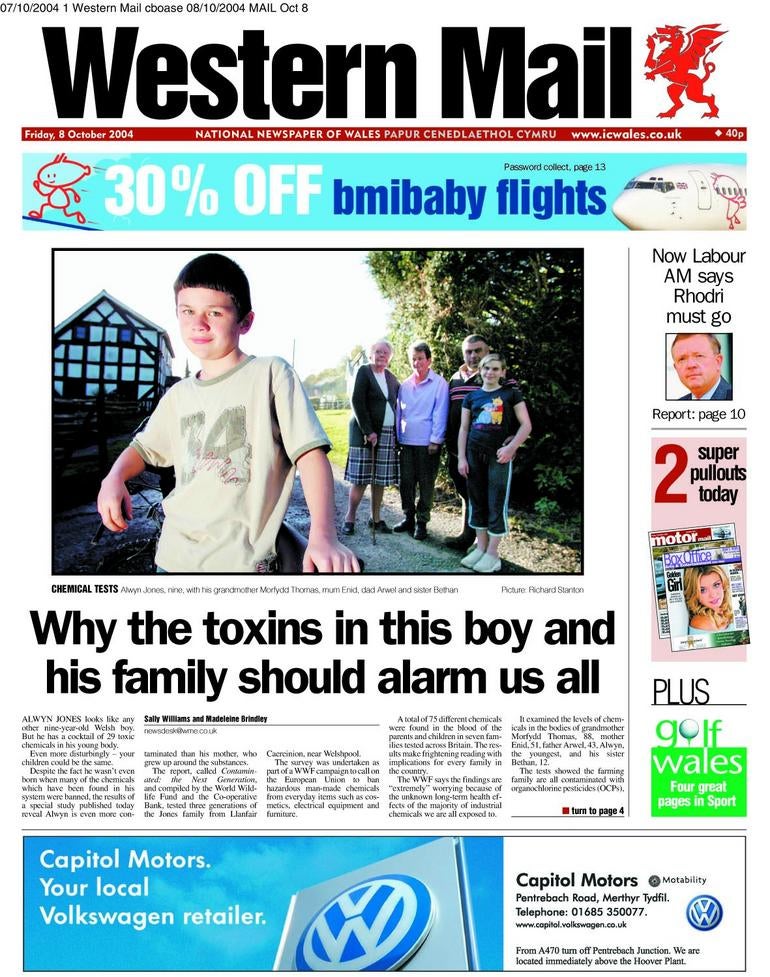
The Welsh Assembly has been told that the country’s media is in a ‘severe crisis’following claims the sector has lost 2,000 jobs in the last decade – and that its only national daily newspaper could become a weekly.
The National Assembly for Wales launched an inquiry into the state of its media in October and today heard evidence from the local branch of the NUJ covering Media Wales – publisher of the Western Mail and South Wales Echo – and Newquest’s South Wales Argus and associated weeklies.
They warned that at Trinity Mirror‘s Media Wales the “widespread view of our members is that the newspapers have a limited remaining lifespan”, adding: ‘There is speculation that within a relatively short space of time the Western Mail will cease to be published as a daily and will become a weekly paper.
‘If that happens, many more jobs will be lost, and Wales will lose its only daily paper that seeks to take a national view of the country.”
Media Wales has denied the claim, saying: ‘We have absolutely no plans to take the Western Mail weekly.”
According to the NUJ, the union’s members have lost faith in the Trinity Mirror management, which it claimed had ‘no discernible strategy beyond the imposition of cuts to make the annual balance sheet look as healthy as possible”.
The union claims journalists at the company have on average endured one redundancy announcement a year since 2003 – as well as the closure of district offices in Swansea, Carmarthen, Neath, Aberdare and Ebbw Vale – and that between 2003 and 2011 around 100 editorial jobs had been lost.
‘No credible strategy’
There are now said to be 138 journalists employed by the company in Wales, with the latest cuts in July seeing 22 full-time editorial staff made redundant.
‘The latest round of cuts has led members to conclude that any further job losses in the editorial department will make title closures all but inevitable,’said the NUJ.
‘Yet with Trinity Mirror annually announcing ‘savings’ equivalent to many millions of pounds, and failing to come up with any credible strategy to end this downward spiral, members now equate pessimism with realism.”
The union claimed that since the National Assembly was established in 1999, Media Wales has made £161.4m in pre-tax profits but that ‘Little of that huge sum has been invested in Wales”.
‘All we have to show 12 years later is a business struggling for survival and the prospect of more of our members sacrificing their jobs so [Trinity Mirror chief executive Sly] Bailey and her fellow directors can continue to reap obscenely high rewards for a little while longer,” it told the Assembly.
Similar cuts have been seen at the South Wales Argus and its sister papers owned by Newsquest, say the union, including the closure of offices in Pontypool and Cwmbran that resulted in five redundancies.
‘While the cuts appear small – an office here, a job there – they are being executed at newspapers that have a long history of slashing budgets, of failing to replace vacancies and closing branches,’said the NUJ.
‘Already without the cuts there are days at the Argus where there is only one reporter working on the Newport edition – and in a worst case scenario that person may have to source and write four stories or more in just one day.”
Tax breaks for local media
The union also claimed the Welsh media ‘crisis’was not one made in Wales: ‘Overwhelmingly, decisions about the future of Welsh media – whether a local weekly paper or the fate of S4C and BBC – are being made by chief executives based outside of Wales and Government ministers in Westminster.”
It is now calling on the Assembly’s Task and Finish group into the Welsh media to make media groups inform workers, the public and politicians at any stage about proposals to close newspapers.
‘For example, if newspaper groups intend to turn a daily paper into a weekly, they should consult with those affected and be prepared to offer to sell the titles to third parties who would be prepared to carry on publishing them,” it said.
‘At such a point the National Assembly and the Welsh Government could act as honest brokers with a view to ensuring the survival of the threatened paper or papers.”
Other suggestions include:
- A levy introduced on commercial operators who benefit from quality public service content – including local news – but do not contribute to its production
- Tax breaks for local media who meet clearly defined public purposes
- Tax credits for individuals who buy quality media
- Direct support to help establish new genuinely local media organisations
- Strategic use of central and local government advertising
- Support for training opportunities that open access to journalism.
Email pged@pressgazette.co.uk to point out mistakes, provide story tips or send in a letter for publication on our "Letters Page" blog
